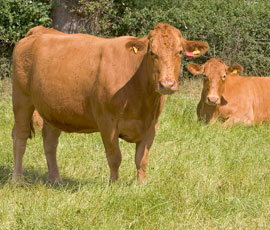Fluke condemns fifth of all cattle livers

A fifth of all cattle livers were condemned last year due to liver fluke, at an industry cost of £16 million a year.
Figures from the Food Standards Agency found 21.7% of all cattle livers in the UK were condemned due to fluke, up 1.1% on the year, with Wales seeing the biggest rise, up 2.29%.
This figure represents a considerable loss to the meat trade, but it will be beef producers who are the biggest losers, said Phil Hadley, EBLEX senior regional manager.
He estimated the loss to the meat trade, as a result of these livers being excluded from the food chain, to be about £2m a year. However, he said the biggest cost was to the producers.
“It is estimated every case of liver fluke costs £25-£30 a farm, attributed to slower growth rates, lower feed conversion efficiencies and greater mortalities. Therefore, fluke could be costing beef farmers in Great Britain £14m a year or as much as £16m across the supply chain.”
This upward trend is worrying, added Merial brand manager Lynda Maris, speaking to Farmers Weekly at the Beef Expo event in Newark. She stressed the importance of not just firefighting and urged farmers to take action to prevent it.
“Fluke is now a year-round problem. The generally wetter, milder weather experienced in recent years has resulted in ideal conditions for liver fluke to breed throughout the season. It is also no longer just a problem for the west, but there is now also a vast amount of infection in the east,” she said.
This means the traditional fluke treatment of cattle at housing may not be enough, with few unaware of the benefits that administering a dose while cattle are at grass can bring, added Ms Maris.
“Administering a flukicide at housing will help clear up an infection. But administering a dose 8-10 weeks after turnout can help break the cycle because it takes 8-10 weeks from ingestion off eggs from pasture to develop in to an adult fluke.”
“Research has also shown that animals treated at grass for fluke and worms have shown a 31% increase in weight gain over untreated animals and an 8% increase over those animals that were just treated for worms,” she said.
But farmers using flukicides should be selective in their treatment, added Neil Eastham, XL Vet Group speaking at the event. “Flukicides are not all the same and will kill different stages of fluke. Resistance has also been reported for triclabendazole in sheep and to avoid this becoming a problem in cattle it is important to administer the correct dose, avoid unnecessary treatment and quarantine and treat new animals.”
